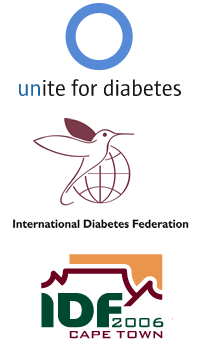いま、1型糖尿病は
2006年09月05日
14 "Unite for Diabetes" Campaign Led by International Diabetes Federation
There is a congress held every three years somewhere in the world with the agenda all related to diabetes including diabetes research, clinical practice and so forth. The congress is organized by the International Diabetes Federation (IDF) and named World Diabetes Congress. The 15th congress was held in Kobe in 1994 and it was the first World Diabetes Congress held in Japan. The 19th World Diabetes Congress scheduled for December this year (2006) will be held in Cape Town, South Africa. The chairperson of this year's congress is Dr. Martin Silink, Professor of Paediatric Endocrinology at University of Sydney, Australia who has served as the president of International Society for Pediatric and Adolescent Diabetes for many years.
Unite for Diabetes

Also in the past, with a prediction that diabetes would pose a great risk to the health of human beings, IDF declared their resolve to carry out sufficient awareness campaign for diabetes and to improve diabetes care in St. Vincent Declaration (1989).
Dr. Silink is still president-elect of IDF and does not officially start as the president until December. Nevertheless, his enthusiasm for Unite for Diabetes campaign has already promoted many activities in various areas.
Activities led by Unite for Diabetes
Unite for Diabetes campaign activities are carried out by working group committees with the following focus: young people (children and adolescents) with type 1 or 2 diabetes, the elderly, migrant populations, indigenous peoples and pregnant women.
I am one of the six members of the working group for "young people with diabetes" and am working on activities together with members from other countries who have different backgrounds and have various ways of thinking. Dr. Yasue Omori, the former Director of the Diabetes Center of Tokyo Women's Medical University (and also professor emeritus of the university) is a member of the working group for pregnant women.
We had our first committee meeting of young people with diabetes working group during 2006 Annual Scientific Sessions of American Diabetes Association in Chicago. From now on, we will have teleconferences, meet again using opportunities such as 2006 Annual Meeting of the International Society of Pediatric and Adolescent Diabetes to be held in UK, 2006 Annual Meeting of the European Association for the Study of Diabetes to be held in Denmark and IDF World Diabetes Congress, and ultimately develop a statement in the form of a charter.
Having listened to other members of the group at the first meeting enabled me to realize once again that there is correlation between a country's economic conditions and the degree of the provision of diabetes treatment in the country. People in many countries are still suffering from miserable conditions.
From IDF Charter to UN Resolution
If everything goes well, it is expected that the United Nations will pass the charter as an UN resolution on diabetes on November, 14, 2007, World Diabetes Day.
Specifically, the working group committee will first clarify what struggle young people with diabetes (both type 1 and 2) in the world are going through, what misconceptions people have about diabetes, how economic factors prevent patients from receiving successful treatment and what can be done to tackle these issues. Then, the committee will develop a draft statement, report it to the enlarged committee for discussion and polish it further.
This charter or resolution itself does not carry any authority to make countries or regions take any actions. However, it will make clear which direction health care professionals like us and those engaged in health-related public administration should move towards in order to fight diabetes.
I wish the charter or resolution consolidating statements of each working group committee to be issued by IDF and UN in 2007 would put strong brakes on global diabetes pandemic and lack of understanding about diabetes.
〈post script〉
The World Medical Association issued the Declaration of Helsinki in 1964 which states ethical principles for the medical community regarding human experimentation. Clinical trials and medical experimentation, for example, are conducted based on this declaration for ethical considerations so that they will not be detrimental to humans involved in them.
©2006 Yasuko Uchigata
国際糖尿病連合の「糖尿病に対して団結して立ち向かおう」キャンペーン
糖尿病に関する研究、臨床、その他、すべて糖尿病に関する国際的な会議が3年ごとに、世界のどこかの国で開催されます。この会議の主催者は、国際糖尿病連合(International Diabetes Federation, IDF)という組織で、会議の名前は国際糖尿病会議(World Diabetes Congress)です。第15回が1994年に神戸で開催されたのが日本ではじめてのことでした。今年(2006年12月)は、第19回国際糖尿病会議が南アフリカ連邦のケープタウンで開催されます。今回の会長は国際小児思春期糖尿病研究会の会長を長らく勤められたオーストラリアの小児科医シリンク教授*です。
*Dr. Martin Silink (Professor of Paediatric Endocrinology, University of Sydney, Australia)

国際糖尿病連合は過去にも、糖尿病が人類の健康を大いに損ねることを予測し、啓蒙活動を
この度のUnite for Diabetesを日本語に直せば、糖尿病に対して団結して立ち向かおう、戦おうということでしょうか。シリンク先生は正式には12月まで次期会長(12月から正期の会長)の立場ですが、先生の意気込みが伝わって、もうこのキャンペーンに呼応する各分野での活動がはじまっています。
わたしは「糖尿病のヤング」グループの6名の実務実行委員会のひとりとして、異なる事情と様々な考えを持つ他国のメンバーと共に、この仕事を進めています。ちなみに、妊婦グループには大森安恵東京女子医科大学糖尿病センター前センター長(同大学名誉教授)がメンバーになっておられます。
ヤンググループの第1回の会合は、2006年アメリカ糖尿病学会(シカゴ)の期間中に行ないました。その後は電話会議で補い、2006年に英国で開催される国際小児糖尿病研究会やデンマークで開催される2006年ヨーロッパ糖尿病学会、2006年の国際糖尿病連合の世界糖尿病会議などの機会に会合をもちながら、最終的にひとつの憲章という声明文を作成していくことになります。
第1回の会合でメンバーのいろいろな話を聞きますと、国の経済状態と治療状況ないし治療の厚みが、いまなお相関していることを再確認できます。悲惨な国がまだまだ多いようです。
具体的には、全世界の糖尿病をもつ若者(1型も2型も)がどのように大変な思いをしているか、そして糖尿病に対してどのようなまちがった認識をされているか、経済的なことで治療がどのようにうまくいっていないのかなどを明らかにし、それらに対して今後どのようにしていくといいのか、実務実行委員会はまず叩き台の文章を作成し、そして、メンバーを増やした拡大委員会に答申し、討議してもらい、さらに文章を練っていきます。
この憲章あるいは決議は、それ自体、国や地域に何かを行なわせる権限をもっているものではありません。しかし、21世紀の今、我々医療従事者、健康に関する行政に従事している者などがどの方向に向かって、糖尿病撲滅のために活動しなければならないのかをより明らかにするでしょう。
2007年に国際糖尿病連合(IDF)ならびに国連から発せられる、各グループの声明を統合した憲章あるいは決議が、流行病のように広がりつつある地球規模的糖尿病人口の増加および糖尿病に対する無理解に対して、強力な歯止めの力となることを願っています。
<追伸>好学のために
世界医師会は1964年にヘルシンキ宣言を発表しています。これは、ヒトを対象とする医学研究の倫理的原則を述べたものです。たとえば、臨床試験や医学的な実験などは、この宣言に則って、倫理的配慮をし、不利益がないように配慮していま
※ヘモグロビンA1c(HbA1c)等の表記は記事の公開時期の値を表示しています。
Copyright ©1996-2024 soshinsha. 掲載記事・図表の無断転用を禁じます。
治療や療養についてかかりつけの医師や医療スタッフにご相談ください。

 医療・健康情報グループ検索
医療・健康情報グループ検索